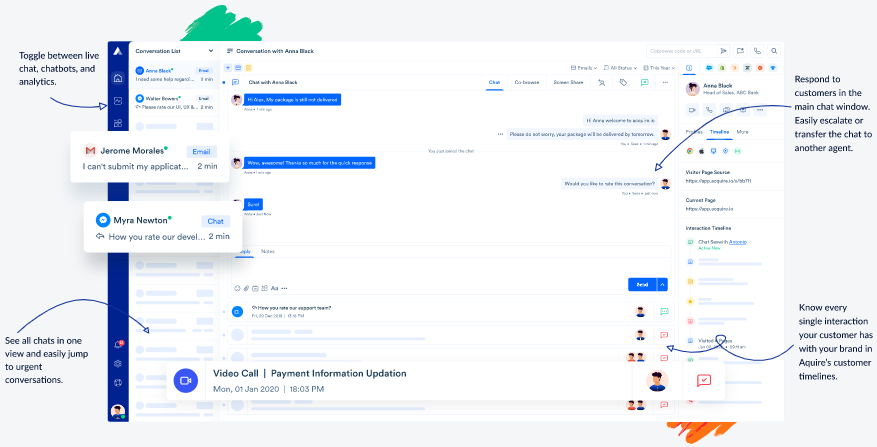
Companies succeed in sowing the seeds of growth. Technology plays the most crucial role in how those companies become successful and gain connections worldwide. As an entrepreneur, you don’t have to climb mountains to grow your business online. Instead, you’ll need some online business sales tools.
Online business sales tools are the powerhouse of great online businesses.
Below are some of the highest-ranking sales tools to work with your team and improve your business. So let’s start discovering — shall we?
What Are Sales Tools?
Sales tools refer to various software, platforms, applications, and resources designed to assist sales professionals in their day-to-day activities and help them achieve better results in the sales process. These tools are specifically developed to streamline sales tasks, enhance productivity, improve communication, and increase sales revenue.
Functions Of Sales Tools
Sales tools serve various functions to support sales professionals throughout the sales process. Here are some standard tasks of sales tools:
- Lead Generation: Sales tools help identify and generate potential leads by providing data, prospecting tools, and lead-scoring capabilities.
- Customer Relationship Management (CRM): Sales tools offer CRM functionalities to manage customer information, track interactions, and nurture relationships.
- Communication and Collaboration: Sales tools facilitate effective communication and collaboration among team members, both internally and with prospects or clients.
- Sales Presentations: Sales tools provide features for creating and delivering impactful sales presentations, including slide decks, multimedia content, and interactive elements.
- Sales Analytics: Sales tools offer data analysis and reporting capabilities to track sales performance, measure key metrics, and gain insights for informed decision-making.
- Sales Forecasting: Some sales tools assist in forecasting future sales by analyzing historical data, market trends, and sales pipelines.
- Sales Automation: Sales tools automate repetitive tasks, such as data entry, email follow-ups, and lead qualification, freeing sales professionals to focus on more strategic activities.
These functions collectively support sales professionals in prospecting, nurturing leads, managing customer relationships, delivering effective presentations, analyzing sales data, and driving more successful sales outcomes.
What Problems Do Sales Tools Fix?
Sales tools address several common challenges and problems faced by sales professionals. Here are some issues that sales tools help fix:
- Lack of efficiency and time-consuming tasks
- Manual data entry and management
- Disorganized sales processes
- Ineffective communication and collaboration
- Limited sales insights and data-driven decision-making
- Inefficient lead generation
- Inconsistent sales processes and performance
- Poor customer relationship management
- Lack of sales training and enablement
- Difficulty in sales forecasting
- Inefficient proposal and contract management
Sales Tools Categories You Must Know
Sales tools can be categorized into various groups based on their functionalities and purposes. Here are some common categories of sales tools:
- Customer Relationship Management (CRM) Software: CRM tools help sales teams manage and organize customer information, interactions, and sales processes. They provide a centralized database of customer data, track sales leads, and automate various sales-related tasks.
- Sales Intelligence Tools: These tools gather and analyze data to provide insights into potential customers and their behavior. They can help sales representatives identify promising leads, understand customer needs, and personalize sales pitches.
- Sales Automation Software: Sales automation tools streamline repetitive tasks, such as email follow-ups, lead tracking, and appointment scheduling. They aim to increase efficiency and productivity for sales teams.
- Email Marketing Platforms: Email marketing tools enable sales professionals to create, send, and track email campaigns to effectively reach prospects and nurture leads.
- Sales Enablement Platforms: Sales enablement tools provide content, training, and resources to help sales representatives engage with customers more effectively throughout the sales cycle.
- Sales Performance Management (SPM) Software: SPM tools help track and manage sales team performance, set goals, and incentivize sales representatives with commission tracking and reward systems.
- Sales Analytics Software: Sales analytics tools analyze sales data and performance metrics to help businesses identify trends, evaluate sales strategies, and make data-driven decisions.
- Sales Forecasting Tools: These tools use historical sales data and other factors to predict future sales performance, assisting businesses in making accurate sales projections and planning.
- Proposal and Quote Generation Software: These tools streamline creating and delivering proposals and quotes to potential clients, making it easier for sales reps to generate and close deals.
- Sales Call and Video Conferencing Software: Communication tools like video conferencing software and sales call platforms facilitate direct interactions between sales representatives and prospects, allowing for personalized sales pitches and presentations.
- Lead Generation Software: Lead generation tools help identify and collect potential customers’ contact information, making it easier for sales teams to reach out to interested prospects.
- Social Selling Platforms: These tools enable sales representatives to leverage social media platforms to connect with prospects, build relationships, and generate leads.
Remember that the sales technology landscape is continuously evolving, and new tools may emerge, or existing ones may be updated to cater to changing market needs. The best sales tools for a business will depend on its requirements, team size, and budget constraints.
How To Select The Best Sales Tool Combination
Choosing the best sales tool mix is essential for maximizing your team’s productivity, efficiency, and overall success. Here are some steps to help you determine the right sales tool mix for your organization:
- Understand Your Sales Process: Begin by thoroughly understanding your sales process, from prospecting to closing deals. Identify the key stages, challenges, and pain points your sales team encounters throughout the process.
- Assess Your Sales Team’s Needs: Involve your sales team in decision-making. Conduct surveys or interviews to gather insights into their current tools, what works well, and what could be improved. Understand their preferences and what they believe would enhance their productivity.
- Define Your Goals: Clearly outline your sales goals and objectives. Different tools may cater to specific objectives, such as lead generation, prospecting, sales enablement, customer relationship management, or analytics. Prioritize the tools that align with your goals.
- Research and Compare Tools: There are numerous sales tools available in the market, each with unique features and benefits. Research various tools, read reviews, and compare them based on their functionalities, user-friendliness, integration capabilities, and pricing.
- Consider Integration: Choosing tools that can integrate smoothly with your existing tech stack is essential. Sales tools that work seamlessly together can streamline processes and reduce the need for manual data entry and duplicate work.
- Ease of Adoption: Evaluate how easy it is to onboard your team onto the new tools. Complex or poorly designed tools can hinder adoption and slow sales.
- Scalability: Consider the scalability of the sales tools. Will they accommodate your team’s growth and increasing demands in the future?
- Trial Periods and Demos: Take advantage of trial periods or request demos to allow your team to experience the tools firsthand. This will help them understand the tool’s functionality and assess its suitability for their needs.
- Cost vs. ROI: Analyze the costs associated with each tool and weigh them against the potential return on investment they can offer. Sometimes, investing more in a high-quality tool can save you money in the long run.
- Vendor Reputation and Support: Choose reputable vendors with a track record of providing excellent customer support. Reliable support can make a significant difference when facing technical issues or needing tool assistance.
- Security and Compliance: If your organization deals with sensitive data, ensure that the tools you choose meet security and compliance standards.
- Training and Support: Consider the availability of training resources and support materials that can help your sales team maximize the use of the tools.
- Feedback and Iteration: Even after implementing the sales tool mix, be open to feedback from your team. Regularly evaluate the tools’ effectiveness and be willing to make adjustments or explore new tools if necessary.
By following these steps, you can create a sales tool mix that empowers your team and optimizes your sales process, ultimately leading to improved results and better customer experiences.
The 11 Best Sales Tools For Closing More Deals
As of 2023, several sales tools can help you close more deals and boost your sales performance. Here are some popular ones:
1.Airfocus

We have all heard the phrase, “Time is of the essence.” This applies in many fields of life, especially in marketing.
Doing multiple small tasks at once is not always a viable solution to getting things done, but that’s where Airfocus comes in.
Airfocus is a prioritization tool that enables team members to coordinate and generate a road map that maximizes time utilization.
Airfocus will help you and your team delegate tasks and use the time that business mostly loses to procrastination.
2. Acquire.io

The real motive of businesses is to connect with customers and provide them with the perfect service and product at the right time.
With service playing a significant role in how customers interact with a business, there is understandably a reliance on customer care.
Customer care teams are often the first to connect with new customers and must be well-equipped to answer prospects’ and customers’ questions.
Acquire is a multichannel platform that lets your team manage a large number of customer requests or queries easily.
It lets your team have the necessary conversations with your customers, ultimately enhancing the customer experience.
This tool also comes with a conversational sales chatbot, saving you time and helping your customers feel you are always there to help.
3. ZipBooks
We all make mistakes, especially when maintaining financial records, but a small error in your books can significantly impact your business.
Small businesses don’t always have the finances to pay for a bookkeeper, resulting in difficulty in accurately maintaining financial accounts. However, for the same, this is one of the most valuable tools. Improvement in financial management helps analyze where to invest what. Hence, there is an increase in business growth via the increase in sales.
And that is why this is one of the sales tools.
Zipbooks is a free tool that helps you ensure the accuracy of your books down to the cent.
With Zipbooks, you can now record necessary checks and receipts error-free.
This automated software automatically lets you maintain all recurring balances accurately.
Furthermore, its AI features also provide insights into your performances and help you to interact with your valued customers.
4. Canva
Graphic design is a crucial part of any modern online business.
Research claims that well-designed business websites rank higher and are more trustworthy than ones that don’t have a significant design element — why miss out on something so simple to add?
Many start-up businesses need help investing in a professional graphic designer, which makes Canva all the more alluring.
Canva is a drag-and-drop tool that is easy to use and readily equipped with many ready-to-use templates.
This graphic design tool has become known for being a tool that even people without design experience can easily use.
What’s even better is that it’s free to use!
Start using Canva to add a professional flair to your website. You might even start loving the art!
5. Zoom
The 2020 Pandemic has taught us many lessons, including working from home.
Because of this, the trend of getting connected from different parts of the world via digital meetings is rising.
Getting in touch with family, friends, and co-workers through tools like Zoom is mandatory.
Zoom is a free video-conferencing tool that takes care of those critical meetings you were about to cancel to accommodate working remotely.
Using a tool like Zoom allows for easy interaction with people from anywhere in the world while making it fun to interact with!
6. Teamwork
Everyone faces a hiccup in their business management. Becoming accustomed to using new tools can be daunting — especially if those tools have many features.
This is where Teamwork comes in.
Teamwork is an online work-management tool that provides everything you need to start and run your online business.
It was mostly a project-management tool in its initial day but has now been developed to be the complete package tool for efficiently managing and running your business.
With large companies like Disney and Netflix using the software, why shouldn’t you also start?
7. ProofHub
If you run a business, managing projects can be a task in and of itself. In situations like this, where you need help managing projects, Proofhub can be the tool you have been looking for all along!
Proofhub is an online tool that allows teams and businesses to organize information to complete projects and meet company deadlines.
Many freelancers, universities, NPOs, and large companies use and recommend Proofhub to manage projects.
Proofhub makes everything related to project management more effortless.
8. Buzzsumo
The content you provide your customers is one of the most valuable business designs that can increase conversation and conversion.
Good content will drive traffic to your website because it works in favor of SEO (read more about content SEO here). To do this, you must post the correct type of content.
Fortunately, Buzzsumo is here to your content rescue!
Buzzsumo keeps you updated with what’s happening in the content world by providing information about what you want and ideas and suggestions about what to write.
This tool also offers analytics to help you find that sweet spot and see how well your content is doing among your site visitors.
9. Google Workspace (G-Suite)
Google is one of the leading technology companies and with good reason.
They offer a plethora of excellent services!
If you’re a fan of Google or even just an average user, chances are you probably know what G-Suite is.
The G-Suite is a package of services Google provides and is one of the sales tools. It helps make business workflow swifter and helps them connect with their teammates more easily.
G-Suite or Google Workspace improves business communication, project management, virtual storage, and cloud computing.
Google Workspace takes the standard email service to a new level and lets your business make an online identity.
Loyal customers suggest using G-suite for its flexibility in documenting and presenting projects with ease.
10. Ahrefs
Competition is everywhere, which is significant when growing your business online.
Competition has become more severe nowadays as people can quickly check the activities through different search engines and decide which horse to bet.
But this topic will become much easier for you to tackle if you know what your competitors are doing.
Ahrefs is a powerful tool that lets you monitor your competitors’ SEO activities and plan your SEO strategies.
11. Slack
“A dream dreamt alone is a dream, and a dream dreamt together is a reality.” Any goal is easy to achieve if the members work together efficiently.
One of the tools for more sales via a better team collaboration that makes dreams a reality is Slack.
Slack is an online collaborative software tool that offers multi-channeled interfaces to unite your team and encourage them to help make dreams a reality.
Some features include offering connections with your team through video conferencing, audio calls, group meetings, file sharing, and more!
Conclusion
In conclusion, today’s best sales tools empower sales professionals to elevate their performance and achieve remarkable results. Whether managing leads, automating outreach, or analyzing conversations, these tools offer valuable insights and efficiencies that can tip the scales in favor of sales success.
By leveraging these cutting-edge technologies, sales teams can build stronger relationships with prospects, deliver impactful presentations, and close more deals. Embracing these tools streamlines the sales process and positions sales representatives as trusted advisors, ultimately driving revenue growth and sustained success in the competitive sales world.








3 replies on “10+ Essential Sales Tools To Help You Close More Deals”
Great web site you have here.. It’s difficult to find high-quality writing like yours nowadays.
I honestly appreciate individuals like you! Take care!!
Appreciate this post. Will try it out.
Google
We came across a cool web site that you just may possibly take pleasure in. Take a look in case you want.